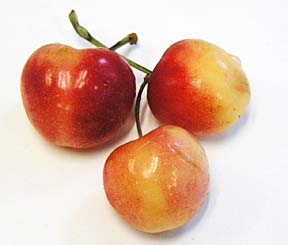

Key Ingredient

|
The luscious Rainier cherry is a prized delicacy, commanding top prices and incurring the highest production costs and risks. One Washington state newswriter calls it a "celebrity" fruit. rainier cherries
The basics: Rainier cherries are a combination of two sweet cherry varieties, Bing and Van. The cherry was developed at Washington State University in the late '50s and early '60s, and was found to be one of the sweetest varieties cultivated.
It is the most cumbersome cherry to grow, requiring much coddling. A hard rain or hailstorm can wipe out an entire crop; strong winds can cause damaging bruises. Harvesting Rainiers is also an art form and is done by hand.
But the demand for Rainiers has never been higher, with Asian markets paying up to $1 a cherry for the gems. The cherries are only available in June and July.
Selecting: By the time Rainiers find their way to our markets, they may look a little scuffed. Unlike Bings, which are a bit sturdier, Rainiers are very fragile and easily bruised.
Look for large, firm, brightly colored fruit with a glossy, blush tinge. Check the bottom of the container for bruised fruit and juice leaks, which indicate smashed fruit. With all cherries, make sure the stems are attached. Cherries deteriorate quickly once stems are removed.
Rainiers from California tend to be smaller and less sweet than the larger, plumper Washington Rainiers.
Storing: Cherries may be stored in the refrigerator in a plastic bag for up to 4 or 5 days. Once washed, however, they should be consumed quickly, because they will start to brown in a day or two.
Use: Because Rainiers are only available about two months out of the year, they are best enjoyed fresh on their own. They can also be an added treat in fruit salads. Or, briefly poach them with sugar and a dash of water and spoon over vanilla ice cream.
Where to buy: Rainiers are available in most markets, only until July. Because of their fragility, their prices are higher than for Bing cherries, at $2.99 to $5.99 a pound.
Food Stuffs: Morsels
Eleanor Nakama-Mitsunaga is
a free-lance food writer. Contact her
online through features@starbulletin.com